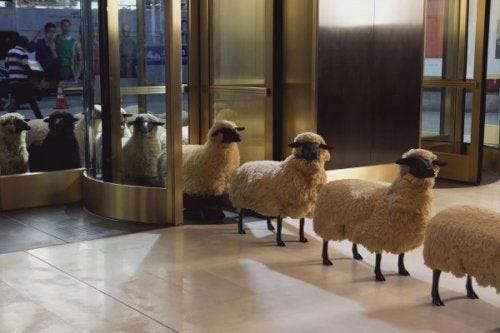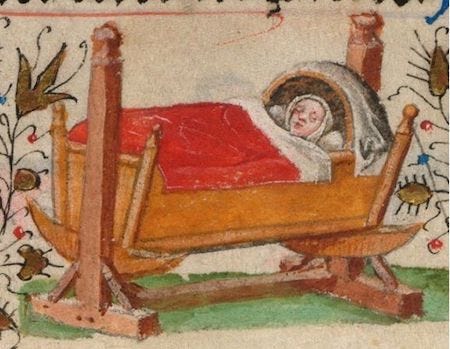The funny thing about sleeplessness is how action-packed it is. Late last night I lay in bed doing my best to mimic a corpse while my brain played pinball. I switched to my stomach, back, side. Opened two windows. Took off nightgown. Put nightgown back on. Arranged myself diagonally across the bed, turning the mattress into a pair of triangles with my body as a hypotenuse.
Two hours passed. I opened a meditation app on my phone and listened to a meditation while observing myself listening with such scientific intensity that I might as well have been holding a clipboard. Drank a glass of water. Counted down backwards from a thousand. Gave up at 689.
More time passed, and I projected the effects of my current sleep failure onto the following day: sluggishness, syrupy eyes, diminished cognition. I began a bargaining process, reasoning that if I could fall asleep now and then squeeze in a late-morning nap, I might recapture some vitality in the afternoon. Content with this plan, I settled in to sleep. But, of course, sleep was onto my tricks and outwitted me.
Morning rolled around, and with it the paradox that all sleepless souls encounter: an expenditure of effort reliably leads to exhaustion in all areas of life—sports, work, sex, chores—except when it comes to the pursuit of sleep, where it has the opposite effect. Every effort compounds into manic dread as the hours go by.
When the sky turned pink I got out of bed and drove to 7-Eleven to buy an energy drink, listening on the way to a news report about a Mormon woman who went insane and killed several individuals. At 7-Eleven there were fifty kinds of energy drink, and from this horn of plenty I chose Monster in “Assault” flavor. Best served ice cold from the frosty can.
I picked up a jar of peanut butter too, partly because I needed it and partly because it pleased me to hold two food items of roughly equal uncanniness in my hands. The Unheimlich of Monster is obvious, but the Skippy is far more unsettling: a terrible fate has been visited upon the innocent peanut in order to produce these jars of tawny homogeneity. One imagines a tangle of dirt-clumped legume entering the Skippy factory and emerging as an an edible industrial sealant fortified with oils that have danced to the music of hydrogen. Is peanut butter a work of art or blasphemy? Why not both?
(Monster Assault is unequivocally blasphemous.)
I rotated the two items as I stood in line to pay. The man ahead of me was buying several million things. He chatted with the cashier.
“Do you know what the largest single-person residence in the world is?” he asked.
She scanned fruit salad, Pepsi, apple fritter.
“Is it the Amazon guy?”
“No. It’s the Vatican!
“Oh, wow.”
The man hoisted his bags and said “See ya soon” to the cashier. Before I paid for my stuff she asked if I was in the military—for discount purposes— and I said no, but was inwardly flattered that she thought someone with posture like mine could be affiliated with any type of armed force.
I stood outside the 7-Eleven for a couple of minutes, draining the Monster (notes of mango, poison) down to a level where it wouldn’t spill from the car’s cup holder. I watched as a woman parked her truck and went inside, trailed by her daughter, who was around six years old. The daughter paused at the door and made eye contact.
“Your hair is messed up,” she said.
Ah, the candor of children. An adult glancing at me would conclude: “Rough night.” A six-year-old can detect aberration— incoherent hair, bloodshot eyes—but lacks a conceptual framework to explain them. How long would this pipsqueak have until she experienced her first sleepless night? Years, I hoped. With luck, decades.
The best writing about sleep comes, of course, from those who have struggled to access it, e.g. Samantha Harvey’s book.
There’s also—uh, always—Shakespeare. After Macbeth kills Duncan he has a meltdown, and insomnia is the starring metaphor. “Macbeth shall sleep no more,” he wails to his wife, already exhibiting one sign of psychosis (referring to self in third person). Actually, at this point he’s hearing voices, so I guess that’s two signs.
Macbeth’s elegy for sleep is my favorite section of the play. It is so detailed! You wouldn’t think that a guy who recently stabbed the king of Scotland would immediately and obsessively enumerate the benefits of sleep, but that’s what he does. Sleep, cries Macbeth, is “sore labor’s bath” and “the balm of hurt minds” and the “chief nourisher in life’s feast.”
Many insomniacs torture themselves by fixating on sleep while they’re attempting it, but Macbeth’s freakout is strictly anticipatory! He doesn’t even have to shut his lids in order to know that dreamland is forever off-limits, for reasons 80% psychological (the realization that he’s a maniac and a coward) and 20% occult (he killed the king while the king was asleep; punishment must symbolically fit crime, etc).
Macbeth’s outburst is a perfect exposition of insomnia’s malice, which is the way it imputes blame to the victim. If sleep is a person’s reward for a day well-lived, then being unable to get there means you really fucked up.
INSOMNIA
RATING: ★★☆☆☆





